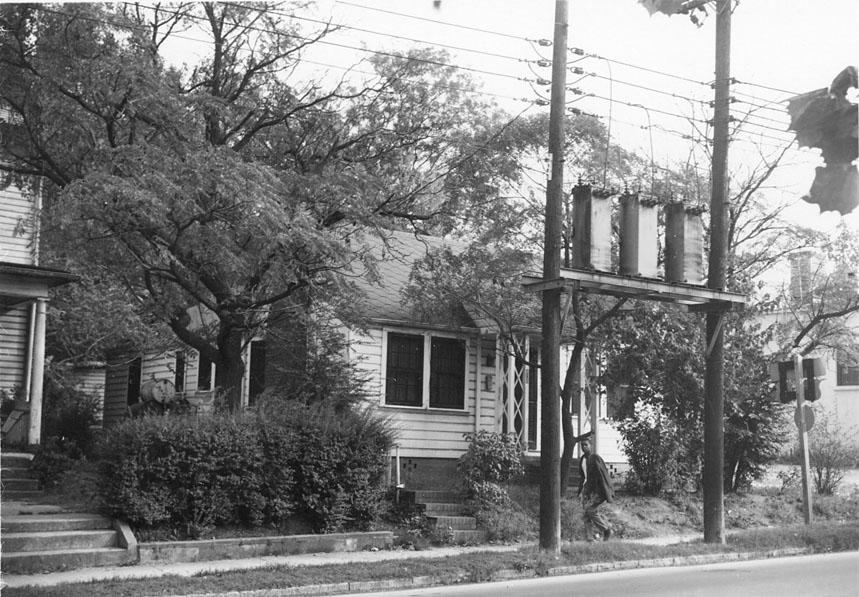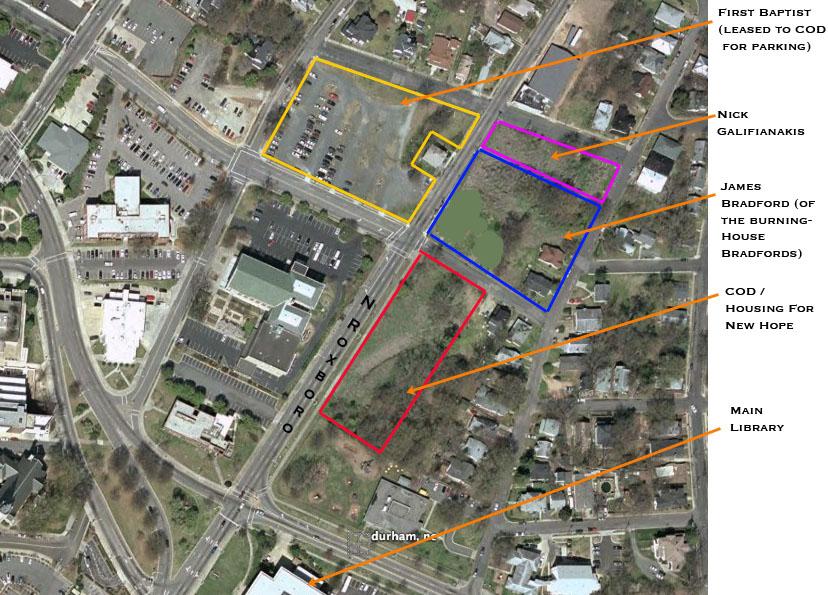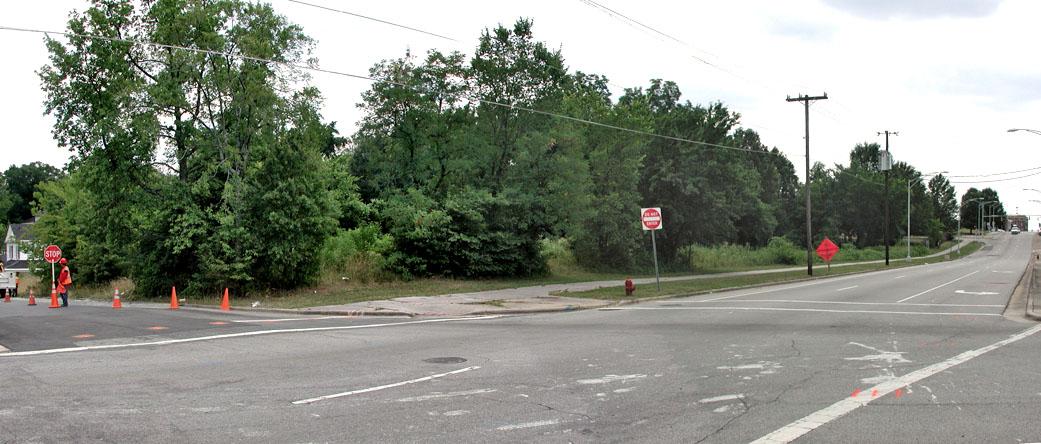406 Roxboro, looking ~east, 1963
So, the deal between the city and Housing for New Hope to essentially donate the eastern side of the 400 block of North Roxboro to the non-profit to construct a "10 unit apartment building for the homeless" is now public, in yesterday's Herald-Sun, which refers to the land as "nearly unusable." The catch in the 1 dollar deal is that the land has a steep drop-off and has a stream-path, likely subject to Neuse buffers.
The article in the Herald-Sun fails to mention that the "nearly unusable" land was not useless until the city seized and demolished the 10 houses on this block as part of the urban renewal program in 1968.
Looking southeast from Roxboro and Elliott/Seminary, 2007.
This small area does not need another exclusively low-income/homeless housing facility. There are a bevy of such facilities / housing within a ~6 block radius from the intersection of Holloway and Dillard. The word on the street, although I've been unable to definitively confirm it, is that the city is entering into another $1 deal for the large vacant parcel at Dillard and Holloway, one block away, to build "housing for at-risk youth".
While the Feds recognized the mistake of highly concentrated neighborhood poverty, and adopted an economic diversity model for their HOPE VI program (an excellent program, now defunded - thanks to our current administration), the proliferation of multiple non-profits devoted to building low-income housing, and the availability of government money to fund their efforts has led to a competitive building frenzy by low-income housing producers. The lack of any small-area planning in Durham means that concentration where land is cheaper (or given away by the government, which is likely to occur where land is cheap) is a foregone conclusion, particularly when your city lacks inclusionary zoning or other policy to bring affordable housing to the suburbs.
The struggle here is that providing for the failure of the private housing market is a good thing; we need housing options for people who cannot participate in that market. But you can have too much of a good thing. Some low-income housing advocates I speak with view the housing market in only those broad terms - they are fighting the good fight against the outpricing of low-income folks, and they must build as many as possible to keep up with that outpricing.
But when that housing is concentrated in a small area, it essentially recreates some of the fundamental problems of housing projects - significant poverty, concentrated in a very small area, brings externalities. Home ownership is not a panacea, particularly when low-income residents may lack the funds for upkeep.
What is our affordable housing deficit in the city of Durham? No one knows. Do we have an affordability problem, or simply a housing/neighborhood quality problem (when houses are selling for $30K in East Durham, perhaps affordability isn't the issue.) How many units do we need - does Self-Help need to build 20 units of low-income housing in West End per year in perpetuity, as is their plan? No one is minding the store on location of government-funded housing by non-profits.
This is another one of those issues that people avoid discussing - some conservatives find subsidized housing/government involvement in the housing market an anathema and tell you the whole business is a waste - get some vouchers. Some liberals will excoriate with invectives of classism, callousness or racism for even discussing the possibility that there could be too much low-income housing.
Both of which avoid the difficult issue - the private housing market persistently fails for low-income people - in part because poverty can bring externalities of its own. We need affordable units - but the goal is to create mixed-income neighborhoods, with enough capital to fight for themselves, but enough affordability to provide for low-income residents. Because what is happening now is economic segregation - rich enclaves in one part of town, and the government-subsidized creation of the new ghettos in another part of town.
Some are all too happy to build endless shelters, halfway houses, homeless apartments, and low-income housing within blocks of the Liberty St. Apartments / Oldham Towers housing projects at Dillard/Main/Liberty Sts and decry opposition. The arguments for such facilities are moralistic, and to object, one must be immoral. But one has to ask - do those advocates live on the east side of town? Would they locate 10-15 of the above facilities within blocks of their own house? If the (honest) answer is no - then the 'moral foundation' is simply noblesse oblige.
My biggest concern has been that the East End has not been organized to shape its own future - and for those who want to demolish buildings/houses, build fortress-like county buildings, add another boarding house/halfway house/homeless shelter, move the library away, etc. - that's just fine. People here don't have the means (or the means to have the time) to hire an army of lawyers like Trinity Park has for 'The Chancellory'. Do you think anyone asked the neighborhood their opinion of the $1 deal? I can tell you, definitively, no.
I'm happy to say that the seeds of neighborhood cohesion are beginning, though. Push on a community long enough, and organization will occur. I hope Housing for New Hope will sit down with the neighborhood and ask what they'd like to see happen with the land; perhaps HFNH can partner with a private developer to provide low-income and market rate housing, or mixed-use development.
Because this is a neighborhood - a mostly poor neighborhood. But they want the things that any neighborhood wants - laundromats, groceries, usable parks, entertainment, etc. It's time to stop treating this neighborhood like the hopes and self-determination of its residents are inconsequential.




Add new comment
Log in or register to post comments.